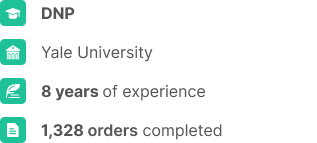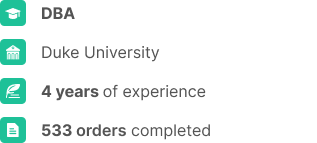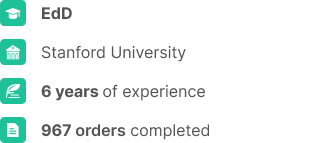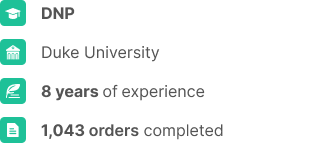
Writing a systematic literature review by a topic-related PhD expert
Get qualified assistance from certified academics with expertise in your field.
Guarantees we provide for each systematic literature review








How we handle writing a systematic literature review

What customers think about our systematic lit review help
Who can write a systematic literature review for you

How to Write a Systematic Literature Review With Professional Help
No thorough academic research is possible without a detailed examination of existing literature. Thus, facing a systematic literature review during your studies is only a matter of time. Especially if you’re studying medicine, nursing, or healthcare. So it would be great if you prepared for this task in advance. That’s why we are here.
As a leading writing service provider, we’ve been helping students for many years. And well-researched systematic literature reviews are what we are really good at. We have mastered our skills and established the most convenient workflow during this time. Our goal is not just writing a systematic literature review quality but to provide competent research assistance.
It doesn’t matter the research topic, the work scope & complexity. Turn to us anytime you feel stuck in your systematic literature overview. We have 360+ qualified experts from over 50 fields who are ready to help you right now.
What Is a Systematic Literature Review: Definition & Key Features
Simply put, a systematic literature review is a research of research works. It involves an in-depth study of existing literature sources on a topic, their evaluation, and analysis. Based on this, you can collect and synthesize solid evidence to answer the stated research question(s) clearly. Data synthesis is a process of combining various pieces of information into a single, coherent story. A systematic literature synthesis can be quantitative (measured), qualitative (narrative), or mixed.
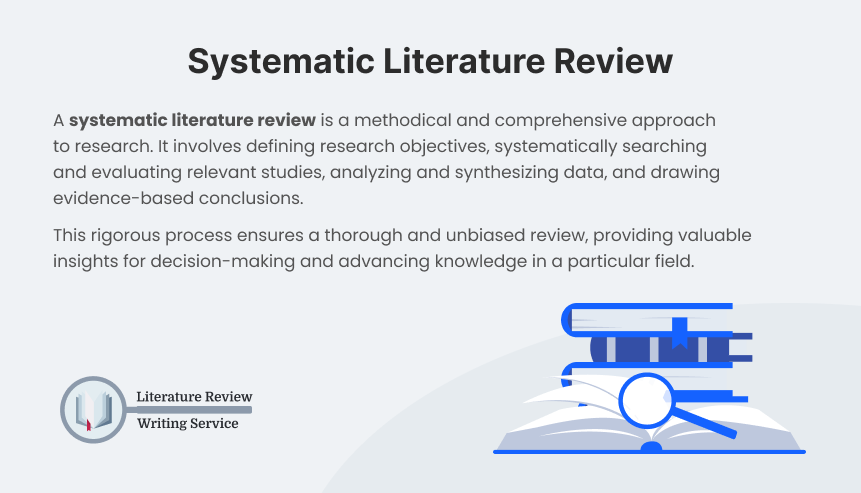
Regarding what is a systematic literature review, it helps you go through numerous studies to find actual research gaps. Then, you can address them with your own research work.
The main feature of a systematic literature overview is that it uses research methods that minimize bias. It has a specific literature review outline and a repeatable working algorithm with an organized and formal approach:
- Defining a clear study question (issue).
- Developing a review protocol based on research background.
- Setting objectives & choosing methodology.
- Seeking all relevant literature in credible scholarly databases.
- Analyzing the sources per the chosen approach and selection criteria.
- Extracting and synthesizing the data.
- Making findings summary and interpretations.
- Writing systematic literature review itself.
A systematic review is a complex and lengthy process. It isn’t easy, even if you already worked on such a task. It can be both an individual assignment or a part of a bigger project. Still, systematic review of literature is among the academic must-haves you need to master in any case. Luckily, you are in the right place where you can get help from experienced PhD and DNP researchers.
Why Seek Professional Help
You’ll not be assigned a systematic overview of literature every week. Although it’s narrow in scope, this is time-consuming and requires teamwork. Thus, even if you know how to write a systematic review of the literature, there are some obstacles to doing it yourself.
Identifying the right topic.
Unlike similar assignments, a systematic overview involves the literature of many previous studies. It’s not about innovation but the effectiveness of current solutions. This way, it requires a clearly defined study question and an adequately chosen topic. Our literature review service can assist you with both.
Work in a team.
Specific systematic literature review steps assume the work of 3 or more researchers. To do this, you can team up with your classmates or get professional help. The second option is often better as you can be sure about your team’s competence.
Access to literature.
Usually, institutions provide students access to scholarly databases. However, they may not be enough. If you turn to specialized services like ours, this problem will be solved. Offering assistance with a systematic review of literature, we also can search for sources in all major free and paid credible databases.
Time.
While a common literature overview takes from several days to weeks, a systematic one may take up to 6 months! Few students have so much free time. But the most difficult thing is for graduate and doctoral students, for whom this is just part of the project. In this case, assistance in writing a systematic review of literature becomes necessary.
Seasoned experts with advanced research skills and subject knowledge can handle this faster. Our team also has professional statisticians, data analysts, and librarians. Thus, your systematic literature overview will be high-quality and done within the shortest possible time.
Systematic Literature Review Steps We Take to Help You
The simplest way to handle a systematic literature review is to take it to the pros. You only need to place an order with instructions, pay, and wait for a completed paper. Any other research and writing hassles will be ours.
Hassle 1: Stating research question(s)
If you still don’t have a clear study issue, we can help you to identify it. Experts carefully analyze all requirements and data available to produce the question that will:
- Effectively interconnect your study to previous works.
- Match your decisions and plans.
- Response to all components of PICO/PICOT.
- Relate the chosen or required research design.
Hassle 2: Developing a protocol or a research plan
It explains how you will do a systematic literature review and includes:
- The study issue background.
- Explanation of why you chose an appropriate topic.
- Your project’s objectives.
- The methods used to explore the literature.
- Criteria for literature selection with explanations.
- Ways you plan to extract the needed data and analyze them.
Please note that we can assist you throughout the whole process. Nevertheless, you may also seek assistance with particular steps. For example, our meta analysis writing services may help you synthesize quantitative evidence.
Hassle 3: Searching for literature in 4 categories
It’s the most difficult and lengthy part of the work. Searching for literature in a systematic lit review should be very thorough. Usually, it requires working with four categories of sources:
- Ones from peer-reviewed databases.
- Primary hand-selected sources.
- Sources of “gray literature”.
- Unpublished materials from field experts.
Selecting systematic literature sources is conducted in two stages:
Preliminary check. We only explore titles & abstracts to choose the most appropriate literature.
Checking the articles’ full texts. At this stage, we extract citations to use in your paper.
We support all referencing styles, such as APA, MLA, or Chicago. Plus, we know how to write a systemic review in a different, less popular format. For example, we can work with the custom rules of your supervisor. Just provide appropriate details when ordering a systematic literature overview.
Hassle 4: Evaluating the literature using selection criteria
Then, we assess the literature using selection criteria from a research plan. It’s applied to the article’s title & abstract and the full text. Of course, every source included or excluded in a systematic literature review is recorded. If needed, you can claim a summary with a PRISMA flow checklist.
Hassle 5: Extracting and synthesizing the data using chosen methods
The information extracted from the literature will contain two types of data:
- Data that matches your chosen methods and research objectives. It may also include the research design, the publishing year, context, conclusions, etc.
- Notes about risks of bias with your own reflections on information quality and evidence reliability.
Next, we’ll synthesize the data for your systematic literature review. We can use both statistical (quantitative) and qualitative methods.
Hassle 6: Writing a systematic review itself
After the main research job is done, experts write a systematic literature overview. They stick to the traditional structure:
- Abstract with a systematic literature overview summary.
- Introduction with objectives and explanations.
- Methodology used for literature search, selection, extraction & synthesis.
- Results and discussion, including findings interpretation and limitations.
- Conclusion responding to the research question.
Once a systematic lit review is done, we carefully double-check it. Professional editors ensure no mistakes and that everything meets your needs. Only then you can download the finished copy and review it. Feel free to request revisions if needed. We allow customers a 14-day revision period to make unlimited edits for free.
The Best Service to Simplify Your Student Life
All the steps described above are not a walk in the park. We understand it well and aim to make writing a systematic literature review easy. You only need to share your assignment details with us. Then, you can relax and monitor the writing progress via your Customer Area. You can actively participate in the process or take it over to us. In any case, the perfect results are assured, as well as your 100% satisfaction.
Do you still have any doubts or questions about how to write a systematic literature review? We’re available around the clock, so feel free to contact us. Drop a line to a Support manager or ask everything from your assigned writer. The expert will be here 24/7 during the whole process of working on your paper.










